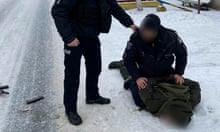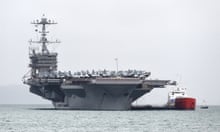Just one month into taking up her office as Germany’s new foreign minister, Annalena Baerbock has her work cut out. At stake: nothing less than the attempt to stop the outbreak of war between Russia and the west.
The news outlet Der Spiegel called her meeting this week with her Russian counterpart, Sergei Lavrov, “a baptism of fire”; Die Zeit, her “first major test of character”. For the tabloid Bild, it was the equivalent of “entering the cave of a bear”.
One left-leaning newspaper mischievously headlined a report about her mission “Baerbock tries to save the climate” – this time referring not to the leading Green’s efforts to tackle the climate crisis but to the considerable task she faces trying to foster dialogue between Europe and Russia to avoid a war involving nuclear powers.
Few pleasantries were observed during her meeting with Lavrov, who has been in office for 17 years. Before and after a two-hour meeting on Wednesday, which took place behind closed doors in his gilded Moscow guesthouse, there was a distinct lack even of polite smiling, while eye contact was minimal. Footage of the opening minutes of the meeting, beamed to journalists in a neighbouring room, showed the two flanked by their aides, facing each other stony-faced across a long table conveniently divided down the middle by a neat row of hand-disinfectant bottles. The usual ritual of a closing photocall was ignored.
Observed from Germany, as the world’s diplomats looked on, silent for now are conservative critics who have questioned whether as a mother of two young children, Baerbock is up to the task. Instead, the burning questions ahead of the encounter were: can she prevent a war? and another pressing domestic concern: is she able to ensure Russia does not cap energy supplies to Germany?
The Russian view of Baerbock as an inexperienced stubborn misfit, out of her depth in her new role, was made clear last month after her appointment. “She is set on a confrontation course with Russia... behaving as if she was from the US Congress, not the Bundestag,” the state broadcaster Rossiya 1 declared.
An expert from the Russian Academy of Sciences told the state-owned news agency Tass: “She is absolutely unsuited to the role. She is not a diplomat. She has no understanding [of] foreign policy and has a negative attitude towards Russia.”
Not only is Baerbock new to the job: at 41, she also belongs to a fresh generation of German politicians. She is the country’s first female foreign minister. She had long since declared her desire to steer a hard course against what is unmistakably perceived, in Berlin and elsewhere, as Russian belligerence. As the counterparts emerged from their meeting to questions from German and Russian journalists, she told them: “I came here with a thick folder – thick due to the whole array of problems we have to discuss, about which our opinions differ hugely, in part fundamentally.”
The most pressing issue: the threatening presence of 100,000 Russian soldiers posted close to Ukraine’s border. As Baerbock put it: “It’s hard not to see this as a threat.”
The day before – the order of the visits was of symbolic importance, her aides stressed – while meeting Ukraine’s foreign minister, Dmytro Kuleba, in Kyiv, Baerbock earned ridicule there after rejecting his request for weapons. Kuleba expressed his disappointment, but responded: “We know from where we can get the weapons.”
She emphasised instead the need for dialogue, calling diplomacy “the only viable way to diffuse a highly dangerous situation”. Lavrov said he was “open” for talks to continue, accusing Ukraine of failing to cooperate. He described his discussion with Baerbock as having been “of use”.
A war of words between the two had begun before the Moscow meeting with Baerbock issuing a statement before her visit, outlining Germany’s position and Lavrov shooting back with an essay-style response about five times longer. He said the Russian government was disappointed about the state of Russian-German relations, accusing Germany of participating in the Nato presence in eastern Europe, expelling diplomats on spurious grounds in relation to the case of the poisoned Russian opposition activist Alexei Navalny, and curtailing press freedom by putting pressure on Russian journalists working in Germany. Russia reserved the right to retaliate against German journalists, he said.
Baerbock referred to the case of Navalny, imprisoned now for a year; to the recent disbandment of the human rights group NGO Memorial; to a murder in a central Berlin park for which a court said last month it suspected Russian intelligence was responsible. And she referred to what is probably the biggest elephant in the room: the controversial gas pipeline Nord Stream 2. Her opposition to it is longstanding – due not only to her green credentials but also to concern it will make Berlin dependent on Moscow. She said it could yet be stopped. “Should energy be used as a weapon this would have appropriate consequences in conjunction with this pipeline,” she said.
Rieke Havertz, a political analyst at Die Zeit, concluded that Baerbock had “moved well within the narrow sequence of steps allowed to her in this, her first dance” on the stage of international diplomacy. It was not easy, Havertz added, for her to represent her Social Democratic boss, Olaf Scholz, whose party has a complicated Russian policy stance, not least due to its last chancellor, Gerhard Schröder’s close relationship with Vladimir Putin, from which the pipeline project was born and in which Schröder continues to be involved. Scholz, like his predecessor, the Christian Democrat Angela Merkel – and in contrast to Baerbock – would like to keep the pipeline separate from the politics and therefore out of the current conflict. For years, analysts have called this position naive. In its editorial on Thursday, the Süddeutsche Zeitung’s foreign editor, Stefan Kornelius, called it Germany’s “most important lever”, and said the impression Germany gave of being unprepared to abandon the pipeline was an “exploitable weakness”.
Bild, not normally a supporter of Baerbock’s, called her visit “a successful debut in the cave of the bear”, praising her for “staying as stable as bamboo” and “not letting her eyelashes quiver”. It added: “She has earned our respect.”
Still, a sober and ironic reality Baerbock now faces is that despite being in the heart of the German government, she has so far had few opportunities to talk about the issue at the heart of her own party’s raison d’etre: the environment. Except to announce in Kyiv that Germany would soon be opening a “bureau for hydrogen diplomacy”. Under the circumstances it sounded, remarked one commentator, “unintentionally funny, even though it was seriously meant”.









